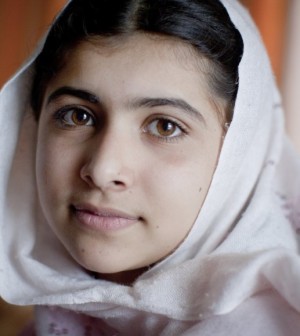- Finding Unshakable Power in a World That Wants to Pull Us ApartPosted 5 months ago
- What could a Donald Trump presidency mean for abortion rights?Posted 5 months ago
- Financial Empowerment: The Game-Changer for Women in Relationships and BeyondPosted 6 months ago
- Mental Health and Wellbeing Tips During and After PregnancyPosted 6 months ago
- Fall Renewal: Step outside your Comfort Zone & Experience Vibrant ChangePosted 6 months ago
- Women Entrepreneurs Need Support SystemsPosted 7 months ago
Learning from the courage of Malala

By Jennifer Heard.
“We cannot succeed if half of us are held back.”
Those are the words of Malala Yousafzai, the teenage Pakistani girl shot in the head by a Taliban terrorist in October 2012 because she is passionate about the right of all girls to education. This courageous, educational activist was evacuated to the U.K. where surgeons repaired her shattered skull and, just last month, on her 16th birthday she addressed the U.N. in New York with a fervent appeal to, “all governments to provide free, compulsory education all over the world for every child.”
This young woman, who has been nominated for the Nobel Peace Prize, seems to understand better than some governments, that education of women is a powerful force of change. The U.S. has invested hundreds of billions of dollars in Afghanistan and Pakistan mainly in military hardware and personnel since 9/11 and has little concrete to see for it. One can’t help but wonder how different the outcome would be had they invested in education.
“When we were in Swat in north Pakistan, we realized the importance of pens and books when we saw the guns,” said Malala. Yes, change can come from the barrel of a gun, but also from the mind of a girl studying her school books under a tree or in a mosque. An educated Pakistani girl will, on average, have fewer children, be more likely to have a job, and exercise more influence on her husband and brothers. More importantly, her children will be less likely to join the Taliban.
“We will power ourselves with the weapon of knowledge,” she told the U.N. wearing a shawl which once belonged to assassinated Pakistani president Benazir Bhutto.
“Here I stand, one girl among many. I speak not for myself, but so that those who are without voice can be heard; those who have fought for their rights: their right to live in peace, their right to be treated with dignity, their right to equality of opportunity, and their right to be educated.”
This passionate appeal from a girl who was willing to put her life on the line for knowledge underlines how the fight for women’s rights isn’t just a politically correct slogan designed to win votes. Women’s empowerment can cause real change because women have real influence on shaping family values and protecting the weak and powerless.
Wherever gender inequity raises its ugly head with deplorable examples of injustices like child trafficking and child labour, women empowerment through women’s rights has prompted necessary changes. For example, the U.S. military has an unacceptable level of sexual violence within its ranks with an estimated 26,000 service member’s experiencing unwanted sexual contact each year. It is fair to say that, only when women continue to speak out, will the proposal of Senator Kirsten Gillibrand to toughen investigations of rape in the military be passed into law.
Nor can women’s education and empowerment be denounced as mere fads when you consider widespread sex trafficking of women and children and laws in many states that give rapists custody rights to children they father. Arial Castro, the Cleveland man who held three young women captive in his house for almost ten years requested the right to visit a child he fathered by rape – a request a sensible judge declined to allow.
It’s no wonder that many educated women feel misunderstood by out-of-touch right wing lawmakers, such as those Republicans who want to restrict access to abortion, contraception, and cancer screening. For example, the Guttmacher Institute in the U.S. reported this month that in 2010, without publically financed contraception programs, the unintended pregnancy rate among teenagers would have been 73% higher! What lawmaker in his right mind would want to cut this program? Certainly not an educated woman!
Overall, women, education and empowerment are not just fuzzy, feminist fads. When women have more gender equity and occupy more positions of influence in the economy and politics, equal rights are more effectively addressed. Just look at Sweden which in 1974 introduced policies that make it mandatory for men to take parental leave. A similar law was adopted in Portugal in 2000 and, three years later, the number of men taking advantage of this leave jumped from very few to between 30 – 40%. Consider these statistics against the fact that the U.S, which has the least generous maternity leave of all Western, industrialized nations (which is completely unpaid) and no paternity leave at all!
Men have long fought for equal rights for women – from getting the vote to birth control to pay equity – but only the true empowerment of women can effect meaningful change. As Malala has shown, nothing stands in the way of the tenacity and determination of a woman who believes in her rights. Not even a sexist terrorist with a gun.
 Jennifer Heard is a 26-year-old from Toronto, Ontario. In 2010 she obtained an honors degree in political science and French and has worked on over a dozen Canadian political campaigns since 2006. Today Jennifer is busy arguing her point of view due to her passion for women’s rights.
Jennifer Heard is a 26-year-old from Toronto, Ontario. In 2010 she obtained an honors degree in political science and French and has worked on over a dozen Canadian political campaigns since 2006. Today Jennifer is busy arguing her point of view due to her passion for women’s rights.






